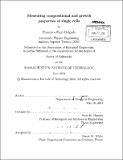Measuring compositional and growth properties of single cells
Author(s)
Delgado, Francisco Feijó
DownloadFull printable version (17.41Mb)
Other Contributors
Massachusetts Institute of Technology. Department of Biological Engineering.
Advisor
Scott R. Manalis.
Terms of use
Metadata
Show full item recordAbstract
The physical properties of a cell are manifestations of its most basic molecular and metabolic processes. In particular, size has been a sought metric, which can be difficult to ascertain with great resolution or for smaller organisms. The advancement of single-cell measurement techniques and the understanding of cell-to-cell variability have renewed the interest in size characterization. In addition, knowledge of how individual cells grow and coordinate their growth with the cell cycle is of fundamental interest to understanding cell development, but various approaches for describing cellular growth patterns have often reached irreconcilable conclusions. In this thesis, a highly sensitive microfabricated single-cell mass sensor - the suspended microchannel resonator - is used to demonstrate cellular growth measurements by mass accumulation for several microorganism, ranging from bacterial cells to eukaryotes and mammalian cells. From those measurements insights about cellular growth are derived, demonstrating that larger cells grow faster than smaller ones, consistent with exponential-like growth patterns and incompatible with linear growth models. Subsequently, the implementation of mechanical traps as means to optimize existing sensors is presented and the techniques are applied to the measurement of total mass, density and volume at the single-cell level. Finally, a method is introduced to quantify cellular dry mass, dry density and water content. It is based on weighing the same cell first in a water-based fluid and subsequently in a deuterium oxide-based fluid, which rapidly exchanges the intracellular water content. Correlations between dry density and cellular proliferation and composition are described. Dry density is described as a quantitative index that correlates with proliferation and cellular chemical composition.
Description
Thesis (Ph. D.)--Massachusetts Institute of Technology, Dept. of Biological Engineering, 2013. Cataloged from PDF version of thesis. Includes bibliographical references (p. 119-128).
Date issued
2013Department
Massachusetts Institute of Technology. Department of Biological EngineeringPublisher
Massachusetts Institute of Technology
Keywords
Biological Engineering.